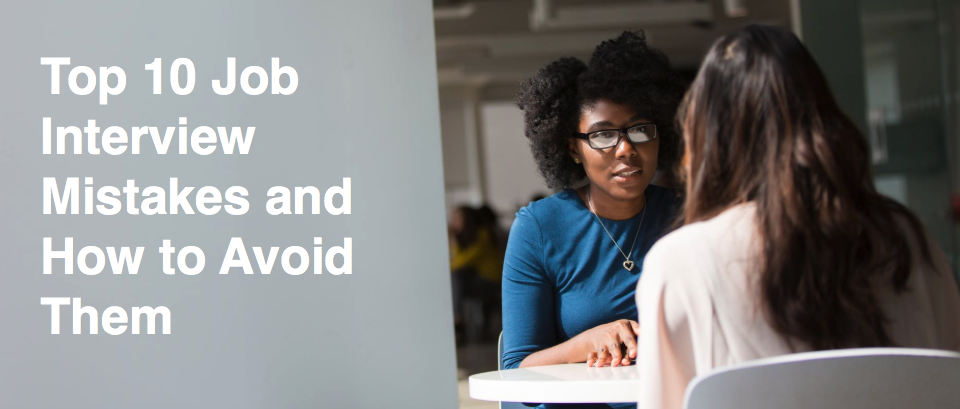
Let’s say that you’re conducting an interview and near the end of the interview the candidate suddenly asks, “What are your most popular products?” In another job interview, an equally qualified candidate for the position displays full knowledge of your company’s products plus shows awareness of the competitive pressures in the employer’s industry. The candidate then goes on to share thoughts concerning the products and competitors. All things being equal, which candidate would you choose?
To prepare yourself for your job interview, so you can put your best foot forward like the second candidate did in the above scenario, here are the top 10 interview mistakes and how to avoid them:
1. Not Managing Anxiety.
Palpable nervousness or anxiety is a distraction. Learning to manage butterflies and keep the focus where it belongs (i.e., your excellent qualifications and what they can contribute to the employer if hired) shows that you are a professional. Learn to control your nerves by studying relaxation techniques to calm yourself. Mastering such methods will show the employer that you are in control, not the anxiety.
2. Dressing Too Casual.
First impressions are key. Interviewers form an opinion about you within the first minute of meeting you, and it will be hard for the interviewer to hear you when distracted by what you are wearing. Dress appropriately for the desired position and then present yourself accordingly. “Dress for Success” is not an empty adage.
3. Not Being Clear.
Interviewing best practices calls for using your best diction and syntax. This involves speaking up, avoiding slang, and enunciating clearly, with a focus on making sure that communication takes place. To avoid this mistake, you can practice with a career coach who can give feedback on how you look and sound.
4. Arriving Late.
One most known among job interview mistakes is arriving late. It is easy to say there is no excuse for being late, despite traffic, weather, and anything else that is beyond your control. Interviewers, however, will insist you be on time. To understand why, look at it from an interviewer’s perspective. They have arranged a tightly packed day to fit in the interviews, but then this carefully planned schedule ends up in tatters because of your tardiness. And this causes a ripple effect in the schedule, inconveniencing other people as well. Always allow extra time for travel, rent a car, ask someone to drive them, or do whatever it takes to be on time. No excuses.
5. Asking About Pay Too Early.
It is essential to know what the salary for the position is but avoid asking about it too early in the process. Unless the interviewer brings it up, the focus should be totally on the company and why you’re a good fit. Asking questions about pay and benefits early can make you appear to be self-centered, so this discussion should be saved for a more appropriate time.
6. Failing to Do the Homework.
A well-written resume by a professional resume writer is only the beginning. You will need to do some pre-work for every interview. Thanks to websites like Glassdoor and LinkedIn, it is possible to find information, such as the names of interviewers, a list of recent news items concerning the employer, and background on their products and services. Knowing this information can be a confidence booster for you and can sometimes lead to making a connection on a more personal level that might not have occurred otherwise. Failure to do homework can be an irritation to the interviewer and a negative point against you. Avoid asking about topics that could have easily been answered with a quick Google search.
7. Rambling On.
A concise answer to interview questions is often the best answer. Focus on what the question is and confine your answers there. This might require extra practice if you have a natural tendency to wander. Being too wordy can make you look less professional and somewhat scattered. Thinking about answers to interview questions is different from what you would actually say in the interview. So, practice answering questions before the interview or even hire a career coach for help in practicing verbal responses.
8. Looking Bored.
You don’t need to be effervescent to show enthusiasm. You can be businesslike, while still showing that you are passionate. This is accomplished by making good eye contact and keeping shoulders back and head up. Also, smile and display body language that is open and indicates that you are listening, which telegraphs that you are interested and care about the person you are speaking with.
9. Forgetting to Say Thank You.
Saying thank you is common courtesy, so remember to do this. Even if the interviewer does not allow an opening for it, you should say thank you and offer a firm handshake. This leaves the interviewer with the reminder that you are poised and professional. Send a timely thank-you note in writing, within 24 hours after the interview, which adds a nice touch and can set you apart from less considerate candidates.
10. Letting Your Guard Down.
Everything you say or do while on the premises where the job interview is taking place is subject to observation and assessment. Maybe you let your guard down when interacting with non-interviewers, but everyone you come in contact with, beginning with the security guard, front-desk person, and administrative assistant, right through to the interviewers and CEO, could potentially be called upon for feedback on you. Treat all interactions, including those at lunch and other downtimes, as part of the interview itself.
There are many reasons why you can be selected for a job, and they certainly include education, qualifications, experience, and a well-written professional resume. However, other factors can influence job interview outcomes.
You can significantly increase your odds of a successful interview by keeping the above common job interview mistakes in mind and doing your best to avoid them.